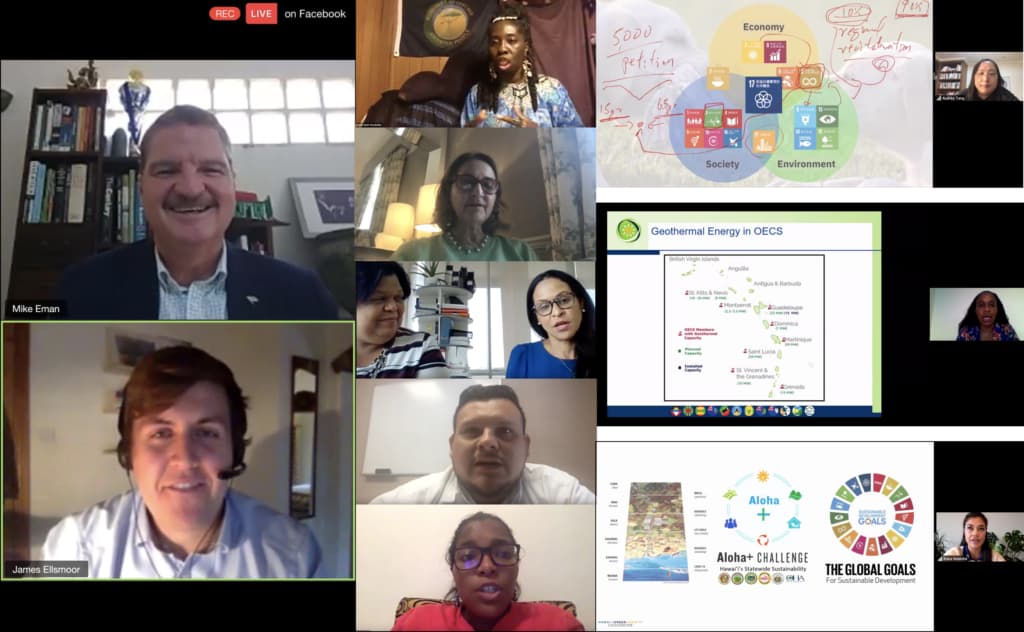As the world struggles with issues such as climate change and recession amidst a global pandemic, a fundamental economic and societal shift is taking place. While many are desperate to “return to normal” the reality is that “normal” is going to look very different when we do eventually reach it – especially for island communities.
In an increasingly interconnected world, we have seen a rapid shift to working from home that is likely to become permanent for many. This change means that businesses will no longer be reliant on physical proximity – and the biggest winners in this change could be islands. Previously limited with small markets and a handful of dominant industries, many islands could not easily integrate with certain aspects of the global economy due to high shipping and travel expenses that made it difficult to compete. In a world where so many services are delivered online, a trend that was only accelerated by the pandemic, there is potential to transform economies and bring new opportunities like never before. But are island businesses ready for this new post-pandemic economy?
The Digital Nomad Visa
Barbados has received global praise for its new “digital nomad” visa to attract long-stay visitors that can contribute to the local economy and replace a slice of the lost tourist dollars. Other countries including Bermuda, Croatia & Estonia have launched similar initiatives and competition is already rising between tourist destinations as a few intrepid travelers become new pioneers. Many have argued that long-stay tourists are the solution for some countries, but the reality of the uptake of these new visas remains to be seen. The truth is that long-stay visitors behave very differently than traditional tourists and the expectation that they offer a panacea could be unrealistic – or at least only a part of the solution. The big opportunity is in attracting permanent, high-wage jobs for local people that will contribute tax revenue and stimulate local businesses. So if you need to acquire your visa in a rush, there are consulates, like the Italian Consulate New York, that can help make that a possibility.

Re-Engaging the Diaspora
Could the remote work phenomenon not benefit islanders in another way? With interconnectivity, islands have an opportunity to take the global stage like never before. The new remote working revolution is not just a chance to attract foreign workers, but also to bring more high-paying jobs for local people and attract emigrants to return. Employers are now taking advantage of recruiting the best possible workers from around the world and extending their operating hours with workers in different time zones. Many of those in the diaspora that may have wanted to return cite job opportunities as a major limitation, and so here lies a bigger opportunity than long-stay tourism that could bring economic empowerment.
RELATED ARTICLES: Can COVID-19 Pave A Path Forward For More Sustainable Travel? |Sustainability and Local Governments in the Context of the COVID-19 Pandemic |“Making It Work”: Female Entrepreneurs Surviving COVID-19 |Virtual Island Summit 2019 Roundup |The Virtual Island Summit: Connecting Islands to Build Sustainable Communities |COVID Waste: How to Manage Hazardous Wastes in the Current Pandemic |The Pacific Paradise Plagued by Plastic: An Interview with Brett W. Howell |
A New Business Mindset
A shift to virtual networking can be an asset for island communities to reach outside the domestic market and build “digital bridges” to other islands looking for similar solutions in all corners of the globe. New markets create more opportunities for entrepreneurs to access global markets from their home. The move to digital format is a huge opening for islands previously seen as being on the ‘global periphery’ to take center stage and showcase what they have to offer. Businesses must change their mindset to put digital communications at the center – it is not enough to be “internet fit” but now a requirement to be “internet first”. By taking a global and geography-independent mindset, island organizations can reap the benefits of the post-pandemic reality.
Islands around the world share certain commonalities including high energy and transport costs, environmental vulnerabilities, and fragile economies reliant on a handful of industries (often tourism). These unprecedented times require a global outlook for islands to connect and engage with one another to find shared solutions and collaborate on the post-pandemic future. One platform for this is the upcoming Virtual Island Summit, which provides a space for island participants from Guam to Greenland, Jamaica to Jakarta and St Kitts to Samoa to connect and engage in order to find shared solutions. Certainly, there are many differences between islands but the many commonalities create a new business environment with access easier than ever before in the new remote working environment.
Digital technology can catalyze change by giving a platform for island communities to share their experiences and expertise with the rest of the world. This change happened slowly but has been accelerated under the global lockdown which has forced everyone to change their lifestyle. Digital bridges are arguably now more important than any other infrastructure – but it is equally important to change how we think to fully take advantage of the new opportunities.
In the picture: The island of Guadeloupe in the Caribbean. Photo Credit: Unsplash.
Editor’s Note: The opinions expressed here by Impakter.com contributors are their own, not those of Impakter.com












